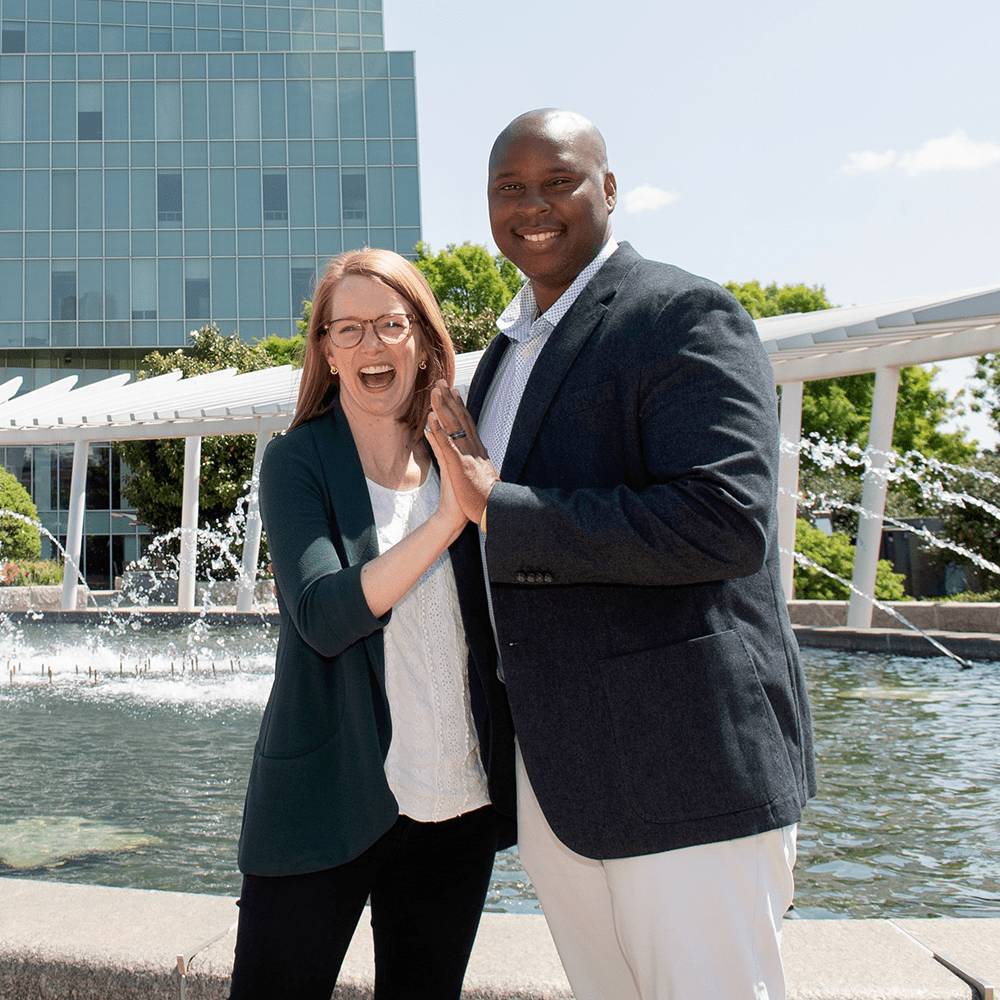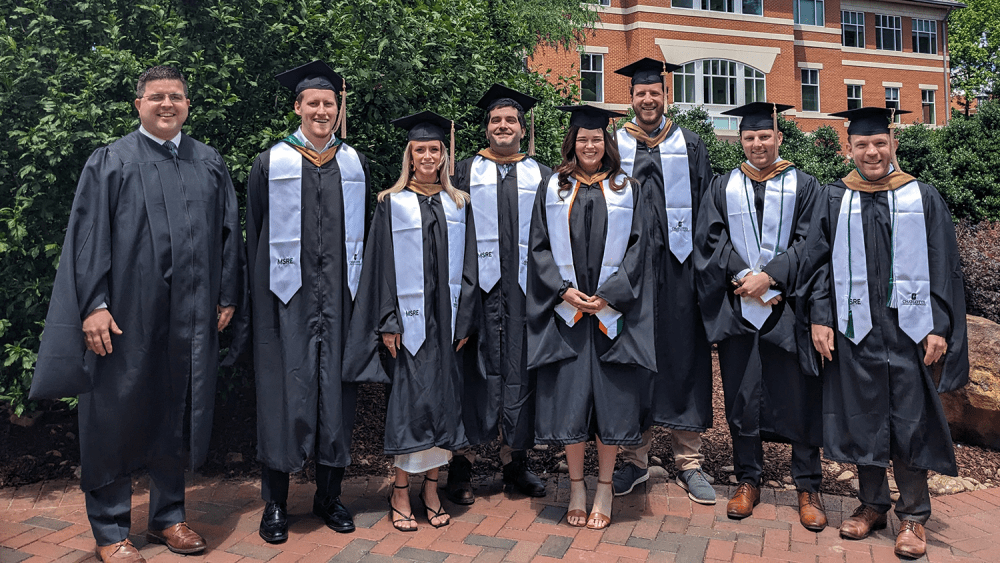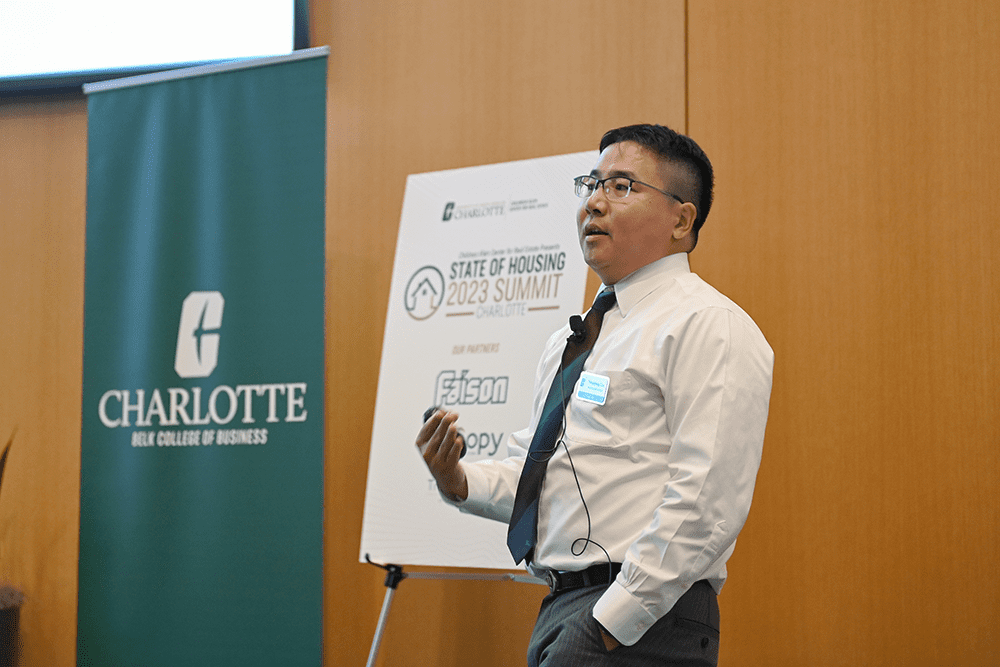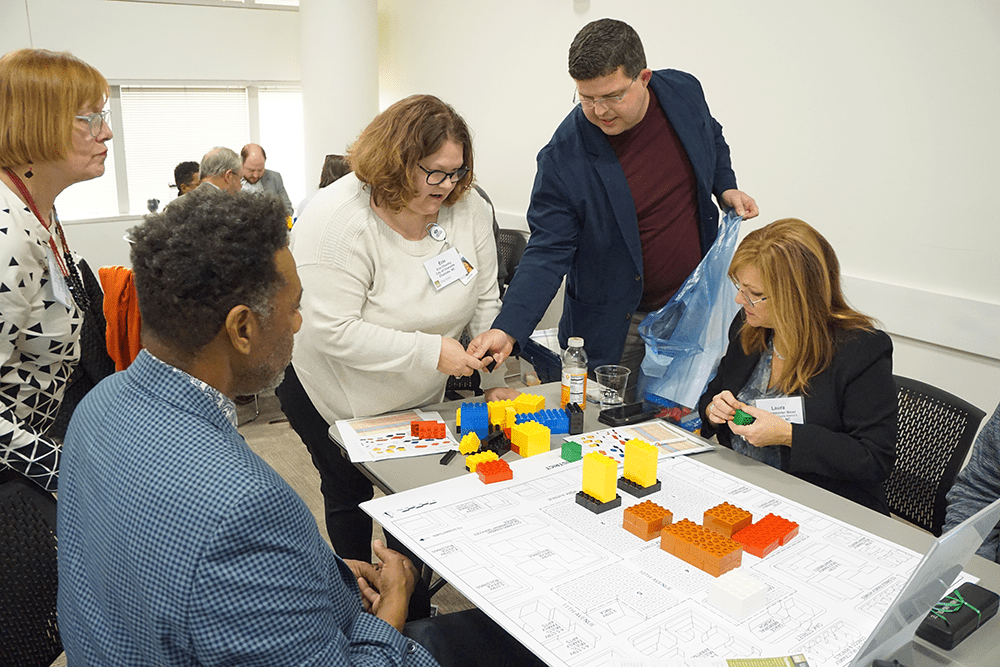Alumni, faculty lead innovation in affordable housing, real estate development

Enough people moved to the Charlotte metro from 2022 to 2023 to create a city roughly the size of Huntersville or Kannapolis, with 49,000+ newcomers relocating to the area.
This brisk pace of growth — combined with a shortage of available housing and high interest rates — means that the Charlotte area faces a daunting shortfall of housing that people with low and moderate incomes can afford. While interest rates have come down and the supply side has improved in recent months, the problem persists.
“It’s a matter of supply and demand,” says Yongqiang Chu, director of the Childress Klein Center for Real Estate in the Belk College of Business. “The population growth has created continuing strong demand for housing. Combined with the lingering effects from the disruption of the supply of housing due to the COVID-19 pandemic, we still see pressure on the housing market.”
Chu and other researchers with the Belk College of Business, along with dedicated alumni, are confronting the enduring challenge of housing affordability and availability in a number of collaborative and innovative ways.
Among those leaders are Liz Ward ‘14 M.S., founder of Give Impact LLC, an advisory services firm focused on affordable housing and upward mobility solutions through real estate; and James Scruggs ‘19 M.S., CEO of Kingdom Development Partners and founder of Ascension Community Development Corporation, intent on creating and developing mixed income, sustainable communities. Ward and Scruggs earned graduate degrees with Charlotte’s Master of Science in Real Estate program and recall being drawn to each other’s energy and commitment to community when they first met.
“James and I became connected through a mutual person we knew through the MSRE program at UNC Charlotte,” Ward says. “James was really curious about affordable housing. He had spent his time focusing on regular market-rate housing. We just started debating the merits of different approaches and really connected, on a personal level and how our faith journey plays a role in how we make decisions, and also in our mutual connection through UNC Charlotte. We have had fun getting to know each other.”

Through their shared interest and respect, they started talking about opportunities to creatively nurture neighborhoods while also building social capital and sustainability.
“Liz is an amazing human being,” Scruggs says. “I consider her a true friend. We are now working together on a partnership with Habitat for Humanity to develop Carya Pond. I appreciate our partners and friends at Give Impact for helping to bring the partnership together. It underscores the importance of collaboration and collective efforts in driving positive change.”
With the Carya Pond community of 83 townhomes, half are to be sold at market rates and half to be sold to families in the Habitat for Humanity program. Kingdom Development Partners and Harmon Construction Services, with CEO Tyrone Harmon, are the formal partners with Habitat.
While Ward and Scruggs and their teams have earned multiple awards from business and community organizations in recognition of their work, their commitment is driven by much more than the well-deserved accolades.
Connecting across organizations and companies drives the Give Impact team. “Instead of focusing on just a specific few (real estate) developments,” Ward says, “I wanted to be able to reach further across the industry and help build connectivity. Folks were working in their silos and there needed to be an increase in connectivity across them. We find ourselves in the middle of nonprofits, market-rate developers and philanthropists and municipalities, building an understanding of what each of those areas is experiencing and bringing them together.”
Similarly, Scruggs approaches his work through a passion for connecting people and resources across what at times can be a divide. “Our goal is to create accelerated generational wealth, and the way that we feel that is done is by having a mixed income community,” he says. “This is when certain homes are market rate, and others are attainable homes for our schoolteachers and our police officers and firefighters.”
For Ward and Scruggs, the Habitat for Humanity project is merely one illustration of how alumni from Charlotte are making a difference in the community. In this one effort, Give Impact director and vice president of operations and impact Maya Bullock earned a master’s degree in urban design; Jennifer Morrell of Habitat for Humanity holds a master’s degree in geography with an emphasis in urban and regional analysis; and Kevin Christiansen ‘19 MSRE is a leadership team member with Kingdom Development Partners.
Belk College prepares real estate professionals to pursue full careers

Scruggs and Ward are joined in the Charlotte market by hundreds of other UNC Charlotte alumni who have earned graduate and undergraduate degrees and graduate certificates and are working directly in commercial or residential real estate or related fields. The Childress Klein Center for Real Estate administers and supports the Master of Science in Real Estate, the MBA Real Estate Concentration, the Bachelor of Science in Business Administration’s Real Estate Concentration in the Finance major and the Graduate Certificate in Real Estate Finance and Development.
Students in the real estate programs learn from expert faculty and industry professionals and from engaged learning opportunities including study abroad, student investment fund experiences, industry talks, networking options and site visits.
“For me, UNC Charlotte’s MSRE program has been a series of master classes enriched by constant interaction with industry leaders who have played a pivotal role in quite literally building Charlotte and the Carolinas,” said Jerry Lee, a current student. “The mentoring process, where students are paired with advisory board members, has given me access to top industry practitioners.”
The Fioretti Student Managed Real Estate Investment Fund stands out, as it provides students with real-world experience in the analysis, investment and management of private and public real estate securities. The fund, one of only a few in the country, permits students to gain in-depth experience by actively participating in private real estate deals. Working closely with real estate faculty and industry mentors, students identify and evaluate real estate investment opportunities. The students present the investments’ performance to a committee composed of faculty and real estate investment professionals.
“The highlight of my education was the Fioretti Student Managed Real Estate Investment Fund class,” said Andrew Jen ’24. “The dialogue between students, instructors and advisory board members has been invaluable. My experience in this class has given me a baseline level of confidence to converse meaningfully and ask the right questions in the real estate industry.”
Faculty provide thought leadership through research, collaboration


Faculty with the Childress Klein Center for Real Estate guide and inform solutions in urban development, land use, investment and capital market issues while fostering innovative theory, policy and practice. Center faculty are leaders in research on emerging issues. Their findings are relevant for businesses, trade organizations, policymakers, other researchers and consumers. They advance knowledge by conducting and publishing studies, presenting at conferences and acting as leaders with academic journals that advance knowledge.
In one of the most impactful research offerings available at no cost to the Charlotte region, center director Chu each year presents the State of Housing in Charlotte report at a community summit. This year’s summit is Nov. 20, with the report presentation followed by an industry panel discussion addressing topics from the report.
In 2023, the summit drew close to 420 developers, government and economic development officials, community members and news media for a first look at the data and the discussion centered on the research findings. Following its release each year, media and community and business organizations turn to the report and its authors for expert analysis of housing issues.
In addition to more formal opportunities, faculty present research and provide informed commentary at industry, agency and community sessions. Topics on which faculty have provided expertise include the state of the housing market, factors affecting low-income housing and evictions, commercial mortgage lending and commercial development, hybrid work and a national legal settlement on real estate commissions.